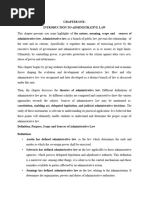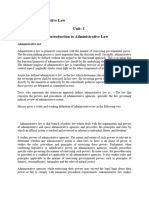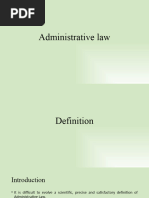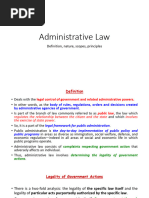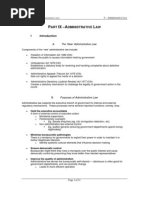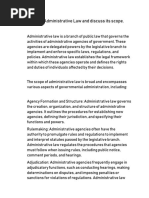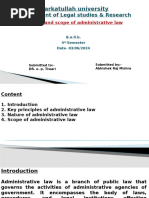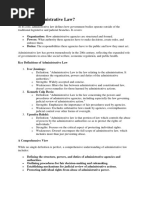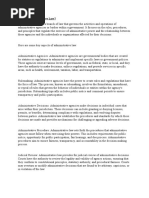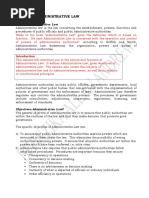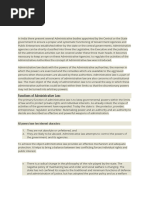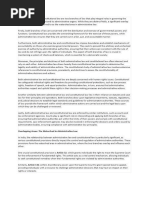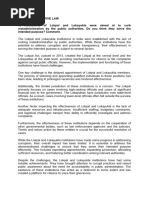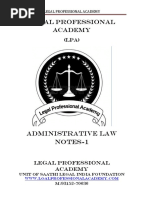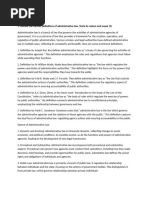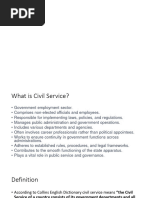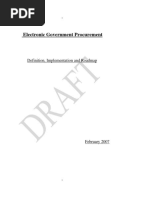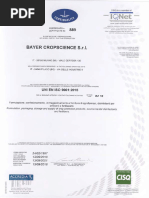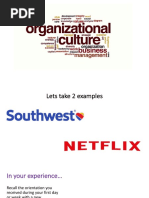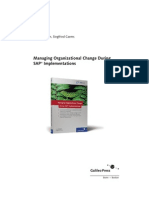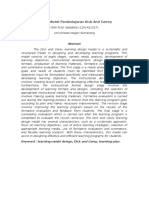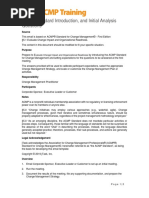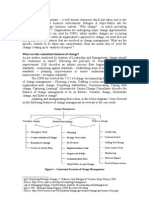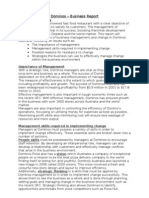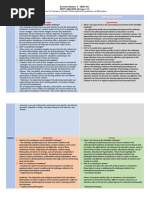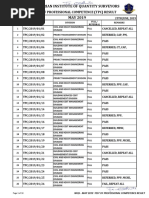0 ratings0% found this document useful (0 votes)
13 viewsAdministrative Law
Administrative Law
Uploaded by
Muhammad Gulraiz Muhammad GulraizAdministrative law governs the activities of executive branch agencies and balances efficiency with fairness and accountability. It establishes frameworks for rulemaking, adjudication, and judicial review of agency actions. The field aims to regulate administrative powers, protect individual rights, and safeguard the rule of law by holding agencies accountable to legal standards and principles of due process.
Copyright:
© All Rights Reserved
Available Formats
Download as PDF, TXT or read online from Scribd
Administrative Law
Administrative Law
Uploaded by
Muhammad Gulraiz Muhammad Gulraiz0 ratings0% found this document useful (0 votes)
13 views44 pagesAdministrative law governs the activities of executive branch agencies and balances efficiency with fairness and accountability. It establishes frameworks for rulemaking, adjudication, and judicial review of agency actions. The field aims to regulate administrative powers, protect individual rights, and safeguard the rule of law by holding agencies accountable to legal standards and principles of due process.
Copyright
© © All Rights Reserved
Available Formats
PDF, TXT or read online from Scribd
Share this document
Did you find this document useful?
Is this content inappropriate?
Administrative law governs the activities of executive branch agencies and balances efficiency with fairness and accountability. It establishes frameworks for rulemaking, adjudication, and judicial review of agency actions. The field aims to regulate administrative powers, protect individual rights, and safeguard the rule of law by holding agencies accountable to legal standards and principles of due process.
Copyright:
© All Rights Reserved
Available Formats
Download as PDF, TXT or read online from Scribd
Download as pdf or txt
0 ratings0% found this document useful (0 votes)
13 views44 pagesAdministrative Law
Administrative Law
Uploaded by
Muhammad Gulraiz Muhammad GulraizAdministrative law governs the activities of executive branch agencies and balances efficiency with fairness and accountability. It establishes frameworks for rulemaking, adjudication, and judicial review of agency actions. The field aims to regulate administrative powers, protect individual rights, and safeguard the rule of law by holding agencies accountable to legal standards and principles of due process.
Copyright:
© All Rights Reserved
Available Formats
Download as PDF, TXT or read online from Scribd
Download as pdf or txt
You are on page 1of 44
Administrative Law
Meaning; Scope and Significance; Nature and Contents of Administrative
Law, Administrative Ethics, Delegation of Authority and Legislation,
Administrative Tribunals; Administrative Law in Pakistan.
Meaning of Administrative Law
• Administrative law is a division of law governing the activities
of executive branch agencies of government. Administrative law
includes executive branch rule making (executive branch rules are
generally referred to as "regulations"), adjudication, and the
enforcement of laws. Administrative law is considered a branch
of public law.
• The branch of public law governing the exercise of powers and
duties by public authorities. It is particularly concerned with the
control of public power by judicial review and by non-judicial
mechanisms such as individual and collective ministerial
responsibility, and the work of the Ombudsman, the Commissions for
Local Administration, and other Commissioners or Ombudsmen.
• There is no universally accepted definition of administrative
law, but rationally it may be held to cover the organization,
powers, duties, and functions of public authorities of all kinds
engaged in administration; their relations with one another and
with citizens and nongovernmental bodies; legal methods of
controlling public administration; and the rights and liabilities
of officials.
• Administrative law is to a large extent complemented
by constitutional law, and the line between them is hard to
draw. The organization of a national legislature, the structure of
the courts, the characteristics of a cabinet, and the role of the
head of state are generally regarded as matters of constitutional
law, whereas the substantive and procedural provisions relating
to central and local governments and judicial review of
administration are reckoned matters of administrative law. But
some matters, such as the responsibility of ministers, cannot be
exclusively assigned to either administrative or constitutional
law. Some French and American jurists regard administrative
law as including parts of constitutional law.
Different Jurists on Administrative Law
John Wade:
• Sees administrative law as a set of legal principles that control the actions
of government administrative agencies.
• Emphasizes the need for judicial control to ensure fairness and prevent
abuse of power by administrative bodies.
• Views administrative law as a vital tool for protecting individual rights
against government overreach.
H.W.R. Wade:
• Argues for a positive view of administrative law, considering it as a
necessary and beneficial component of the legal system.
• Emphasizes the role of administrative law in filling gaps left by traditional
legal doctrines, adapting to the complexities of modern governance.
Friedrich A. von Hayek:
• Takes a more critical stance, expressing concerns about the
potential for administrative law to lead to arbitrary decision-making.
• Argues that excessive administrative discretion can undermine the
rule of law, calling for clear limits on administrative power.
Lon Fuller:
• Advocates for the idea of procedural fairness and adherence to the
rule of law within administrative processes.
• Emphasizes the importance of providing reasons for administrative
decisions and ensuring that individuals affected by these decisions
have the opportunity to be heard.
Kenneth Culp Davis:
• Views administrative law as a means of reconciling the need for
flexibility in administration with the need for legal controls.
• Proposes a model of "administrative common law," suggesting that
courts play a key role in developing legal principles to guide
administrative actions.
A.V. Dicey:
• Takes a more traditional approach, expressing skepticism about
administrative law's expansion and its potential to create a separate
legal system for administrative agencies.
• Argues that the principles of the rule of law should apply equally to
all branches of government, including administrative bodies.
Scope
• the scope of administrative law encompasses the regulation of
administrative agencies, the judicial review of their actions, and
the protection of individual rights and liberties in the face of
administrative decision-making. It establishes a legal framework
that seeks to balance the efficiency of administrative processes
with the principles of fairness, accountability, and the rule of law.
Regulation of Administrative Agencies:
• Rule-Making Authority: Administrative law governs the
process through which administrative agencies create rules and
regulations. This includes defining the scope of agencies' rule-
making authority, ensuring it aligns with legislative intent, and
establishing procedures for public input and review.
• Adjudication Processes: Administrative law outlines the
procedures and standards for administrative adjudication,
ensuring fair and transparent decision-making when agencies
resolve disputes or enforce regulations. This includes principles
of due process, the right to a hearing, and the availability of
judicial review.
Judicial Review of Administrative Actions:
• Review of Agency Decisions: Administrative law provides a
framework for the judicial review of administrative actions, allowing
individuals and entities to challenge agency decisions in court.
Courts assess whether agencies acted within their legal authority,
followed proper procedures, and made decisions based on
substantial evidence.
• Scope of Review: Administrative law defines the scope of judicial
review, determining the extent to which courts can intervene in
administrative decisions. This involves assessing questions of law,
fact, and procedural regularity, ensuring a proper balance between
agency discretion and accountability.
Protection of Individual Rights and Liberties:
• Due Process Safeguards: Administrative law incorporates
principles of due process to protect the rights of individuals
affected by administrative actions. This includes the right to
notice, a fair hearing, and the opportunity to present evidence
before adverse decisions are made.
• Protection Against Arbitrary Actions: Administrative law aims
to prevent arbitrary and capricious decision-making by
administrative agencies, emphasizing the need for decisions to
be rational, reasonable, and based on relevant evidence. This
protects individuals from unjust or discriminatory administrative
actions.
Significance
• Safeguarding Rule of Law and Individual Rights:
Administrative law plays a crucial role in safeguarding the rule
of law by providing a framework that regulates the powers and
actions of administrative agencies. It ensures that these
agencies operate within the confines of legal authority, follow
fair procedures, and respect individual rights. By establishing
principles of due process, judicial review, and protection against
arbitrary actions, administrative law acts as a bulwark against
potential abuses of power, fostering a system where
government actions are accountable, transparent, and aligned
with fundamental legal principles.
Reasons behind development of admin law
Inefficiency of Courts
Easy Methodology
Less Technical
Objectives
• Control of Government Powers: Administrative law keeps government
authorities within their bounds so that the legitimate interests of citizens
do not suffer.
• Remedy to Aggrieved Person: The prime object and function of
administrative law is to provide remedy to the aggrieved person.
• Equal Status of State and Public: Administrative law keeps balance
between State and public.
• Effective Use of Government Power: Administrative law is utilized
effectively as compared to ordinary court of law.
• Public Utility: The ultimate objective of administrative law is to protect the
interests of public as it interacts with the public.
• Maintenance of Rule of Law: Administrative law aims to maintain rule of
law as it not only secures the interests of public but also keeps the
governmental authorities within their limits.
Contents of Administrative law
Delegation of Authority:
Principles outlining the lawful delegation of authority from the legislature to
administrative agencies.
Determination of the scope and limits of agency authority to ensure it aligns with
legislative intent.
Rule-Making Procedures:
Guidelines for the process through which administrative agencies create rules and
regulations.
Requirements for public notice, comment periods, and public hearings to ensure
transparency and public participation.
Adjudication Processes:
Procedures governing administrative adjudication, including the conduct of hearings
and the resolution of disputes by administrative agencies.
Principles of due process, fair treatment, and the right to be heard in administrative
proceedings.
Judicial Review:
Framework for the judicial review of administrative actions, defining the scope and
standards for reviewing agency decisions.
Grounds for challenging administrative decisions, such as actions beyond the
agency's authority, procedural irregularities, or decisions not supported by substantial
evidence.
Agency Discretion:
Principles guiding the exercise of administrative discretion, including the need for
rationality, reasonableness, and consideration of relevant factors.
Balancing the concept of agency discretion with the requirement for accountability
and adherence to legal standards.
Public Accountability:
Mechanisms for ensuring public accountability of administrative agencies, such as
reporting requirements, transparency measures, and public access to information.
Oversight procedures to prevent and address corruption, abuse of power, or
maladministration within administrative bodies.
Individual Rights and Liberties:
Safeguards protecting individual rights in the face of administrative actions,
including the right to due process, fair treatment, and protection against
arbitrary decisions.
Balancing the interests of individuals with the broader societal goals pursued
by administrative agencies.
Remedies and Enforcement:
Availability of remedies for individuals aggrieved by administrative actions,
including the right to appeal, compensation, or injunctive relief.
Enforcement mechanisms to ensure compliance with administrative decisions
and orders.
Administrative Common Law:
Development of legal principles through precedents and case law specific to
administrative law.
Evolution of doctrines that guide administrative decision-making and judicial
review.
Administrative Ethics
• Administrative ethics refers to the principles and standards of
conduct that guide the behavior of individuals working in
administrative roles within government or other organizations. It
involves ethical considerations in decision-making, interactions
with the public, and the overall conduct of administrative
officials. Administrative ethics seeks to ensure that individuals in
positions of authority act in a manner consistent with moral
values, integrity, and public trust.
Integrity:
Definition: Upholding honesty, truthfulness, and a commitment to ethical principles.
Explanation: Administrative ethics emphasizes the importance of integrity in decision-
making and actions, promoting transparency and trust between government officials
and the public.
Impartiality:
Definition: Treating all individuals fairly and without bias in administrative processes.
Explanation: Administrative officials are expected to make decisions based on
objective criteria, avoiding favoritism or discrimination. Impartiality ensures that
administrative actions are just and equitable.
Accountability:
Definition: Taking responsibility for one's actions and being answerable for the
consequences.
Explanation: Administrative ethics requires officials to be accountable for the
decisions they make, acknowledging errors and taking corrective measures when
necessary. Accountability fosters public confidence in the administrative process.
Confidentiality:
Definition: Safeguarding sensitive information and respecting the privacy of
individuals.
Explanation: Administrative officials often deal with confidential data. Upholding
confidentiality is crucial for maintaining trust and protecting the privacy rights of
individuals involved in administrative processes.
Legal Compliance:
Definition: Adhering to laws, regulations, and policies governing administrative
actions.
Explanation: Administrative ethics requires officials to operate within the legal
framework, ensuring that their decisions and conduct comply with applicable laws and
regulations.
Objectivity:
Definition: Approaching decisions without personal bias or undue influence.
Explanation: Administrative officials are expected to base decisions on facts and
evidence rather than personal preferences. Objectivity ensures fair and reasoned
decision-making.
Public Service Motivation:
Definition: A commitment to serving the public interest and welfare.
Explanation: Administrative ethics encourages a sense of public service motivation among
officials, emphasizing their responsibility to contribute positively to the well-being of the
community.
Conflict of Interest Management:
Definition: Identifying and addressing situations where personal interests may conflict with
professional duties.
Explanation: Administrative ethics requires officials to proactively manage and disclose
potential conflicts of interest, ensuring that their decisions are not unduly influenced by
personal gain.
Whistleblower Protection:
Definition: Safeguarding individuals who report unethical or illegal activities within an
organization.
Explanation: Administrative ethics promotes a culture that protects whistleblowers,
encouraging transparency and accountability by allowing individuals to report misconduct
without fear of retaliation.
Admin Trinunals
• Administrative tribunals are quasi-judicial bodies that have been
established to adjudicate disputes and matters related to
administrative decisions, actions, and regulations. These
tribunals are distinct from regular courts and are designed to
provide a specialized forum for addressing specific categories
of disputes arising from administrative actions.
• Tribunals have been defined as “Bodies outside the hierarchy of
the courts with administrative or judicial functions”
• Ombudsmen (270-A)
• In Pakistan, at present, there are five Federal
Ombudsmen, i.e., Wafaqi Mohtasib, the Federal Tax
Ombudsman, the Federal Insurance Ombudsman, the
Federal Ombudsperson for Women and Banking Mohtasib
• Provincial Ombudsman
• Federal Ombudsman Secretariat for Protection Against
Harassment (FOSPAH)
• Service Tribunals (212)
• Federal
• Provincial
Specialized Jurisdiction:
Administrative tribunals in Pakistan typically have specialized jurisdiction,
focusing on specific areas such as taxation, labor, and administrative law
matters. Each tribunal is created to handle disputes within its designated
domain.
Expertise and Composition:
Members of administrative tribunals often possess expertise in the relevant
field, ensuring a nuanced understanding of the issues at hand. For example,
a tax tribunal may include members with tax law expertise.
Independence:
The independence of administrative tribunals is crucial to their effective
functioning. Members are expected to act impartially, free from external
influence, and their decisions are subject to judicial review to ensure
adherence to legal principles.
Speedier Resolution:
One of the purposes of establishing administrative tribunals is to expedite the
resolution of disputes. The specialized nature of these tribunals allows for
quicker and more efficient adjudication compared to the regular court system.
Adherence to Principles of Natural Justice:
Administrative tribunals are generally required to adhere to the principles of
natural justice, ensuring fair procedures, the right to be heard, and impartiality
in decision-making.
Limited Appellate Jurisdiction:
Decisions of administrative tribunals are subject to judicial review, typically in
the High Court. The appellate jurisdiction is limited to questions of law,
ensuring that specialized expertise remains a hallmark of the tribunal system.
• Scope of Matters:
• Administrative tribunals may deal with a wide range of matters,
including disputes related to tax assessments, employment issues, and
challenges to administrative decisions made by government bodies.
Public Management Skills
Planning
• Strategic Vision:
• Planning in public management requires the ability to formulate a strategic vision for the
organization. This skill involves analyzing the external environment, understanding
organizational strengths and weaknesses, and setting long-term goals that align with the
mission and objectives of the public entity.
• Resource Allocation:
• Effective planning involves the judicious allocation of resources, including budgetary,
human, and technological resources. Public managers with this skill can assess
organizational needs, prioritize initiatives, and allocate resources in a manner that
optimizes efficiency and effectiveness.
• Contingency Planning:
• Planning as a public management skill also encompasses the capacity to anticipate and
prepare for unforeseen challenges and risks. Public managers must be adept at
developing contingency plans that outline alternative courses of action in response to
potential disruptions or changes in the external environment.
Decision Making
Analytical Evaluation:
Public managers skilled in decision-making possess the ability to
critically analyze complex situations, evaluate relevant data and
information, and assess potential outcomes. This skill enables them to
make informed and evidence-based decisions that align with
organizational goals and address public service challenges effectively.
Strategic Prioritization:
Decision-making in public management involves strategic prioritization,
where managers must weigh competing interests, allocate resources
judiciously, and identify the most impactful courses of action. A skilled
public manager excels in balancing diverse stakeholder needs while
ensuring that decisions contribute to the overall mission and objectives
of the public organization.
Conflict Management
Mediation and Resolution:
• Skilled conflict managers in public management can mediate disputes and
facilitate resolution processes. They possess the ability to understand
conflicting perspectives, engage stakeholders diplomatically, and navigate
negotiations to reach mutually acceptable outcomes.
Effective Communication:
• Conflict management as a skill in public management involves adept
communication to de-escalate tensions, foster understanding, and convey
solutions. Public managers with this skill can articulate issues clearly, listen
empathetically, and communicate decisions effectively to mitigate conflicts
and maintain a harmonious working environment.
Leadership
Visionary Leadership:
Effective leadership in public management involves casting a compelling
vision for the organization, inspiring others to share in that vision, and aligning
actions with overarching goals. Visionary leaders in the public sector guide
their teams towards a common purpose and motivate them to achieve
collective objectives.
Strategic Decision-Making:
Public leaders need the ability to make strategic decisions that align with the
organization's mission and goals. This includes analyzing complex situations,
considering long-term implications, and making choices that enhance the
overall effectiveness and impact of public services.
Team Building and Motivation:
Leading in public management requires the skill of building and motivating
teams. Effective leaders foster a collaborative and inclusive work
environment, recognize individual strengths, and encourage teamwork to
enhance organizational performance.
Communication
Effective Communication:
Communication is a critical leadership skill. Public leaders must convey ideas
clearly, listen attentively, and engage in transparent communication with
stakeholders. Effective communication builds trust, fosters understanding,
and ensures that organizational objectives are communicated to all relevant
parties.
Adaptability and Change Management:
Leaders in public management must navigate change and uncertainty. The
ability to adapt to evolving circumstances, lead through change, and promote
a culture of resilience within the organization is crucial for successful
leadership.
Ethical Decision-Making:
Ethical leadership is fundamental in the public sector. Leaders must make
decisions with integrity, adhering to ethical principles and maintaining public
trust. Ethical decision-making establishes a foundation for sound governance
and responsible public service delivery
• Clear and Coherent Messaging:
• Definition: Public managers proficient in effective communication convey information clearly and
coherently, ensuring that messages are easily understood by diverse stakeholders.
• Importance: Clarity in communication helps prevent misunderstandings, fosters transparency, and
ensures that organizational goals and policies are effectively communicated to both internal teams
and the public.
• Adaptability and Audience Awareness:
• Definition: The ability to adapt communication styles based on the audience, context, and purpose,
demonstrating awareness of diverse stakeholder needs.
• Importance: Public managers who are adaptable in their communication approach can engage
effectively with different stakeholders, from government officials to community members, fostering
positive relationships and understanding.
• Strategic Communication Planning:
• Definition: The skill of developing and implementing communication plans aligned with
organizational objectives, ensuring consistent and impactful messaging.
• Importance: Strategic communication planning allows public managers to articulate organizational
priorities, navigate complex issues, and manage crises effectively, contributing to public trust and
organizational success.
Admin Buffering
• Navigating Bureaucratic Complexity:
• Definition: Administrative buffering involves the skill of navigating complex bureaucratic structures,
procedures, and processes to streamline decision-making and enhance organizational efficiency.
• Importance: Public managers adept at administrative buffering can expedite decision-making,
mitigate bureaucratic red tape, and ensure that organizational goals are achieved more efficiently.
• Interdepartmental Coordination:
• Definition: The ability to facilitate communication and coordination between different departments
or units within an organization, promoting collaboration and synergies.
• Importance: Administrative buffering skills contribute to improved interdepartmental collaboration,
reducing silos, enhancing information flow, and fostering a more cohesive organizational
environment.
• Conflict Resolution and Stakeholder Management:
• Definition: The skill of managing conflicts and addressing concerns among stakeholders, both
internal and external, to maintain a positive organizational climate.
• Importance: Public managers proficient in administrative buffering can navigate conflicting
interests, mediate disputes, and manage stakeholder relationships effectively, promoting a
harmonious and cooperative work environment.
Managing change
• Change Leadership:
• Definition: The ability to guide and inspire organizational change by providing a clear vision,
fostering a culture of adaptability, and effectively communicating the reasons for and benefits of the
change.
• Importance: Public managers skilled in change leadership can navigate resistance, build support,
and ensure a smooth transition during organizational transformations.
• Stakeholder Engagement:
• Definition: The skill of involving and communicating with various stakeholders throughout the
change process, including employees, government officials, and the public.
• Importance: Managing change requires engaging stakeholders to gain their buy-in, address
concerns, and create a collaborative environment, fostering a sense of shared responsibility for the
success of the change initiative.
• Adaptability and Flexibility:
• Definition: The ability to be flexible and adaptive in response to evolving circumstances,
unforeseen challenges, and feedback during the change process.
• Importance: Public managers proficient in adaptability can adjust strategies, policies, and
implementation plans as needed, ensuring that the organization remains responsive to changing
conditions and maximizes the success of the change effort
Managing diversity
Cultural Competence:
• Definition: The ability to understand, respect, and navigate diverse cultural backgrounds, values, and perspectives within
the organization and the community.
• Importance: Public managers skilled in cultural competence can foster an inclusive and supportive work environment,
ensuring that policies and practices consider and respect the diverse cultural identities of employees and stakeholders.
Inclusive Leadership:
• Definition: The skill of creating and sustaining an inclusive organizational culture by promoting diversity, equity, and
inclusion in decision-making, policies, and practices.
• Importance: Managing diversity involves cultivating an inclusive leadership style that values the contributions of all
individuals, encourages diverse perspectives, and ensures equitable opportunities for professional growth and
development.
Conflict Resolution in Diverse Teams:
• Definition: The ability to manage conflicts that may arise due to diverse perspectives, backgrounds, and experiences within
teams or organizations.
• Importance: Public managers proficient in conflict resolution in diverse settings can address differences constructively,
foster collaboration, and harness the strengths of a diverse workforce to achieve organizational goals.
Stress management
• Resilience and Coping Strategies:
• Definition: The ability to bounce back from challenges, setbacks, and high-pressure situations,
employing effective coping mechanisms to maintain mental and emotional well-being.
• Importance: Public managers skilled in stress management can navigate the demanding nature of
public management roles, promoting personal resilience and mitigating the negative impact of stress
on job performance.
• Work-Life Balance Advocacy:
• Definition: The skill of promoting and supporting a healthy balance between professional
responsibilities and personal life for oneself and team members.
• Importance: Public managers who advocate for work-life balance contribute to a positive
organizational culture, reduce burnout among team members, and enhance overall job satisfaction
and performance.
• Prioritization and Time Management:
• Definition: The ability to prioritize tasks, set realistic goals, and manage time efficiently, preventing
the accumulation of undue stress from overwhelming workloads.
• Importance: Stress management in public management involves effective prioritization, ensuring
that tasks are organized, deadlines are met, and resources are allocated optimally, ultimately
contributing to a healthier work environment.
delegation
• Strategic Assignment of Tasks:
• Definition: The skill of assigning tasks and responsibilities to team members based on
their strengths, expertise, and capacity, aligning assignments with organizational goals.
• Importance: Delegation in public management ensures that tasks are distributed
strategically, optimizing the use of skills within the team and promoting efficient workflow.
• Empowerment and Team Development:
• Definition: The ability to empower team members by entrusting them with
responsibilities, fostering professional growth and skill development.
• Importance: Effective delegation contributes to team members' sense of ownership,
motivation, and skill enhancement, ultimately building a more capable and resilient
workforce in public management.
• Risk Mitigation and Time Management:
• Definition: Delegation involves assigning tasks to capable individuals, mitigating the risk
of bottlenecks and ensuring that time-sensitive activities are completed efficiently.
• Importance: Public managers skilled in delegation can effectively manage workloads,
reduce their own stress, and enhance overall organizational productivity by distributing
tasks among qualified team members.
Public sector motivaton
• Intrinsic Motivation for Public Service:
• Definition: Public service motivation refers to the intrinsic desire to contribute to the public good,
serve the community, and make a positive impact on society.
• Importance: Public managers with a strong public service motivation are more likely to be
dedicated, committed, and passionate about their roles, fostering a sense of purpose and dedication
within the organization.
• Stakeholder-Centered Approach:
• Definition: Public service motivation involves prioritizing the needs and interests of citizens and
stakeholders, demonstrating a commitment to serving the public.
• Importance: Public managers with a stakeholder-centered approach ensure that policies and
decisions align with the public interest, promoting trust, and enhancing the legitimacy of the public
management process.
• Ethical Decision-Making:
• Definition: Public service motivation includes a commitment to ethical decision-making, prioritizing
integrity, transparency, and accountability in all actions.
• Importance: Public managers with a strong public service motivation contribute to a culture of
ethical conduct, ensuring that decisions and actions align with the values of public service and
uphold the trust placed in public institutions
Creativity and Problem Solving
• Innovative Problem Solving:
• Definition: The ability to approach challenges with creative and novel solutions, thinking beyond
conventional methods to address complex issues.
• Importance: Public managers with strong creativity and problem-solving skills can navigate the
dynamic nature of public management, devising innovative strategies to overcome obstacles,
improve service delivery, and foster organizational efficiency.
• Collaborative Decision-Making:
• Definition: The skill of involving diverse perspectives, encouraging teamwork, and engaging
stakeholders in the problem-solving process to arrive at well-rounded and effective solutions.
• Importance: Creativity in public management involves collaborative decision-making, leveraging
the collective intelligence of teams and stakeholders to generate comprehensive solutions that
consider various viewpoints and potential impacts.
• Adaptability to Change:
• Definition: The ability to adapt problem-solving approaches based on evolving circumstances,
embracing change, and adjusting strategies as needed.
• Importance: Public managers with creativity and problem-solving skills are better equipped to
navigate uncertainty, respond to emerging challenges, and lead their teams in finding dynamic
solutions that align with organizational goals and public needs.
Issues in Public Management
Bureaucratic Inefficiency:
Complex bureaucratic structures can lead to slow decision-making processes,
hindering the effective and efficient delivery of public services.
Corruption and Lack of Transparency:
Corruption remains a pervasive issue in public management, eroding public trust.
Lack of transparency in decision-making and resource allocation can exacerbate
these problems.
Budgetary Constraints:
Public organizations often operate with limited budgets. Adequate resource allocation
is crucial for effective service delivery, and budget constraints can hinder the
implementation of essential programs.
Human Resource Management:
Recruiting, retaining, and managing a skilled and motivated workforce can be
challenging. Issues such as outdated personnel policies, inadequate training, and low
morale may impact the overall efficiency of public services.
Political Interference:
Political pressures and interference in administrative decisions can compromise the
impartiality and effectiveness of public management. Political motivations may
influence policy decisions, staffing, and resource allocation.
Public Accountability:
Ensuring public officials and organizations are accountable for their actions is an
ongoing challenge. Establishing mechanisms for transparency and accountability is
crucial to maintaining public trust.
Technological Challenges:
Rapid technological advancements require public management to adapt and integrate
digital tools for efficient service delivery. However, the adoption of technology may
face obstacles such as budget constraints, resistance to change, and cybersecurity
concerns.
Public Engagement and Participation:
Engaging citizens in decision-making processes and ensuring their active
participation in public affairs is often challenging. Building a culture of civic
participation requires effective communication and outreach strategies.
Policy Implementation Gaps:
The gap between policy formulation and effective implementation can lead to the
failure of well-intentioned policies. Factors such as inadequate planning, resource
constraints, and resistance to change can contribute to these gaps.
Ethical Dilemmas:
Public managers often face ethical challenges in decision-making. Balancing
competing interests, avoiding conflicts of interest, and upholding ethical standards in
public service can be complex.
Global Challenges:
Issues such as climate change, migration, and global health crises require
coordinated efforts across borders. Public management needs to adapt to global
challenges, and the lack of international collaboration can hinder effective responses.
Emergency and Crisis Management:
Responding to emergencies, natural disasters, and crises demands effective
coordination and quick decision-making. Inadequate preparation and response
strategies can lead to widespread repercussions and negatively impact public
perception.
Lack of Innovation:
Public management can sometimes be resistant to change and innovation.
Embracing new ideas and technologies is crucial for staying relevant and
addressing emerging challenges effectively.
Inequality and Social Justice:
Addressing issues of inequality, discrimination, and social justice is a
significant challenge for public management. Ensuring equitable access to
public services and resources is an ongoing concern.
Strategic Planning and Long-Term Vision:
The lack of long-term planning and a strategic vision can impede the
effectiveness of public management. Public organizations need to set clear
goals, align resources, and plan for the future to address evolving challenges.
You might also like
- ServiceNow Master The Change Management ProcessDocument17 pagesServiceNow Master The Change Management ProcessDalipKumar100% (3)
- Change ManagementDocument35 pagesChange ManagementCirclleNo ratings yet
- HRSGDocument21 pagesHRSGrabia2090No ratings yet
- Meaning of Administrative LawDocument6 pagesMeaning of Administrative Lawvanshika.tainwalaNo ratings yet
- Administrative LawDocument68 pagesAdministrative LawShankar Shesherao ChavanNo ratings yet
- AL Module-1Document20 pagesAL Module-1xakij19914No ratings yet
- Administrative LawDocument16 pagesAdministrative LawPiku NaikNo ratings yet
- Chapter One and Two Admintrartive LawDocument23 pagesChapter One and Two Admintrartive LawhassanNo ratings yet
- Administrative Law NotesDocument19 pagesAdministrative Law NotesthreadscorporationindNo ratings yet
- P S JAIN'S ADMINISTRATIVE LAW - KSLU (1ST UNIT)Document20 pagesP S JAIN'S ADMINISTRATIVE LAW - KSLU (1ST UNIT)natarajparamesh6No ratings yet
- Notes of Administrative Law (PNC)Document65 pagesNotes of Administrative Law (PNC)Dainik SamajNo ratings yet
- DefinitionDocument15 pagesDefinitionjyoti panditNo ratings yet
- PA105_Lecture-1112_51-JUPADocument24 pagesPA105_Lecture-1112_51-JUPAmahadikhan029No ratings yet
- Adminstration LAW ConciseDocument22 pagesAdminstration LAW ConciseKrupa Diamond DandNo ratings yet
- What Is Administrave Law - 064832Document19 pagesWhat Is Administrave Law - 064832ELTON YUMBENo ratings yet
- 09 Administrative Law Administrative - Law Administrative - LawDocument0 pages09 Administrative Law Administrative - Law Administrative - LawBoy Kakak Toki100% (1)
- Administrative LawDocument30 pagesAdministrative LawShivam Mani TripathiNo ratings yet
- Admin LawDocument15 pagesAdmin Lawstuti ghalayNo ratings yet
- Administrative Law IIDocument69 pagesAdministrative Law IIsrigurubaghNo ratings yet
- Administrative LawDocument10 pagesAdministrative Lawabhi.mishra8966No ratings yet
- Administrative Law - Part I - SlidesDocument69 pagesAdministrative Law - Part I - Slidespriyanshikawadiya95No ratings yet
- admin law (notes with QP) - 142 - CopyDocument142 pagesadmin law (notes with QP) - 142 - Copysourabhjain19976.sjNo ratings yet
- Admin LawDocument6 pagesAdmin LawmangalagowrirudrappaNo ratings yet
- 1 Evolution and Scope of Admin LawDocument8 pages1 Evolution and Scope of Admin Lawsarthak chughNo ratings yet
- Administrative LawDocument18 pagesAdministrative Lawemmanuel bonaparteNo ratings yet
- Summary of Admin LawDocument74 pagesSummary of Admin LawIrish D DagmilNo ratings yet
- Introduction To Administrative Law LDocument46 pagesIntroduction To Administrative Law LPeter GriffinNo ratings yet
- Admin NotesDocument31 pagesAdmin NotesShantanu YewaleNo ratings yet
- Balance of Powers-WPS OfficeDocument7 pagesBalance of Powers-WPS OfficeHaseeb Ahmed KhadimNo ratings yet
- AL Module-5Document13 pagesAL Module-5xakij19914No ratings yet
- administrative law.pdfDocument127 pagesadministrative law.pdfHiya HegdeNo ratings yet
- Administrative Law & AdrmDocument38 pagesAdministrative Law & AdrmGOSWAMINo ratings yet
- What Is Administrative LawDocument2 pagesWhat Is Administrative LawIgnatius LingNo ratings yet
- Nature of Adminstrative LawDocument4 pagesNature of Adminstrative LawZeesahnNo ratings yet
- Admin Law PresentationDocument2 pagesAdmin Law Presentationskandaspam02No ratings yet
- ADMINISTRATIVE LAW NotesDocument6 pagesADMINISTRATIVE LAW Notesmugbeh.mbrewahNo ratings yet
- Administrative LawDocument15 pagesAdministrative LawtimothybwongyerwaNo ratings yet
- Introduction To Admin Law - Week 1 & 2Document64 pagesIntroduction To Admin Law - Week 1 & 2Jaiyesh AshokanNo ratings yet
- Diploma in Law Notes 2023Document119 pagesDiploma in Law Notes 2023Ssali Anthony blacNo ratings yet
- Administrative LawDocument7 pagesAdministrative LawManas PandeyNo ratings yet
- Adm 1Document4 pagesAdm 1nandini161216No ratings yet
- Administrative LawDocument33 pagesAdministrative LawRAI SHAHZAIB MUMTAZNo ratings yet
- 1002 Administrative LawDocument125 pages1002 Administrative LawpraveenconsultationsNo ratings yet
- Define The Term Administrative LawDocument5 pagesDefine The Term Administrative LawAr Eva Rajkumari NingthemchaNo ratings yet
- UNIT ONE & Two Administrative LawDocument25 pagesUNIT ONE & Two Administrative LawwubeNo ratings yet
- Introduction of Administrative LawDocument3 pagesIntroduction of Administrative Lawseankirby.malonesNo ratings yet
- Adminsitrative Law: Introducation, Nature & ScopeDocument8 pagesAdminsitrative Law: Introducation, Nature & ScopePranayNo ratings yet
- Unit 1a Nature, Scope and Development of Admin LawDocument5 pagesUnit 1a Nature, Scope and Development of Admin LawMim- anshaNo ratings yet
- Class 1Document19 pagesClass 1Jennifer AshrafNo ratings yet
- Module 1 Class NotesDocument66 pagesModule 1 Class NotesJennifer AshrafNo ratings yet
- Administrative LawDocument7 pagesAdministrative Lawmustaq ahmedNo ratings yet
- Administrative Law NotesDocument39 pagesAdministrative Law NotesPeter Political100% (1)
- Administrative LawDocument99 pagesAdministrative LawharshitaNo ratings yet
- admin law (notes with QP) - 88 finalDocument88 pagesadmin law (notes with QP) - 88 finalsourabhjain19976.sjNo ratings yet
- 775-1363-1-PB (1)Document23 pages775-1363-1-PB (1)Christopher AllagoaNo ratings yet
- Administrative LawDocument8 pagesAdministrative LawtairupaskidNo ratings yet
- Nature of Administrative LawDocument14 pagesNature of Administrative LawChloeNo ratings yet
- Nature and Scope of Administrative LawDocument9 pagesNature and Scope of Administrative LawManinderNo ratings yet
- Administrative Law Notes (7th Sem) JoeyaDocument20 pagesAdministrative Law Notes (7th Sem) Joeyapareekmadhur07No ratings yet
- Administrative LawDocument59 pagesAdministrative LawLJ TzNo ratings yet
- The administration and you - A handbook: Principles of administrative law concerning relations between individuals and public authoritiesFrom EverandThe administration and you - A handbook: Principles of administrative law concerning relations between individuals and public authoritiesNo ratings yet
- Insiders Talk: Guide to Executive Branch Agency Rulemaking: Policy, Procedure, Participation, and Post-Promulgation AppealFrom EverandInsiders Talk: Guide to Executive Branch Agency Rulemaking: Policy, Procedure, Participation, and Post-Promulgation AppealNo ratings yet
- The administration and you – A handbook: Principles of administrative law concerning relations between individuals and public authoritiesFrom EverandThe administration and you – A handbook: Principles of administrative law concerning relations between individuals and public authoritiesNo ratings yet
- Civil ServiceDocument42 pagesCivil ServiceMuhammad Gulraiz Muhammad GulraizNo ratings yet
- The Cabinet Mission Plan: Main RecommendationsDocument2 pagesThe Cabinet Mission Plan: Main RecommendationsMuhammad Gulraiz Muhammad GulraizNo ratings yet
- Cripps Mission Plan: BackgroundDocument2 pagesCripps Mission Plan: BackgroundMuhammad Gulraiz Muhammad GulraizNo ratings yet
- Updated Math 6Document132 pagesUpdated Math 6Muhammad Gulraiz Muhammad GulraizNo ratings yet
- CSS Essay Poverty Alleviation - Complete Solved Essay (CSS Exams 2005)Document5 pagesCSS Essay Poverty Alleviation - Complete Solved Essay (CSS Exams 2005)Muhammad Gulraiz Muhammad GulraizNo ratings yet
- QUIZ - Revision - AnswersDocument8 pagesQUIZ - Revision - AnswersSyakira WahidaNo ratings yet
- E ProcurementDocument38 pagesE Procurementmtuanlatoi9704100% (1)
- Chapter 2Document20 pagesChapter 2Prakash BoroNo ratings yet
- Wa0000.Document26 pagesWa0000.Ausaf AhmadNo ratings yet
- Certificato ISO 9001 2015 Emiss 2018Document2 pagesCertificato ISO 9001 2015 Emiss 2018parwana formuliNo ratings yet
- Penyelesaian Masalah Menggunakan Old Dan New Seven ToolsDocument14 pagesPenyelesaian Masalah Menggunakan Old Dan New Seven ToolsAndiNo ratings yet
- Cima E3 SyllabusDocument8 pagesCima E3 Syllabuscrazypaniya100% (1)
- FDA-ISO QMS Audit Checklist Greenlight GuruDocument3 pagesFDA-ISO QMS Audit Checklist Greenlight GuruAli ImamudeenNo ratings yet
- mgn-581 Unit 6Document36 pagesmgn-581 Unit 6Ashish kumar ThapaNo ratings yet
- Sappress Managing Organizational ChangeDocument49 pagesSappress Managing Organizational ChangesushmeherNo ratings yet
- Desain Model Pembelajaran Dick and CarreyDocument17 pagesDesain Model Pembelajaran Dick and CarreyArinasikahNo ratings yet
- ACMP Standard Introduction, and Initial Analysis Questions: SourceDocument3 pagesACMP Standard Introduction, and Initial Analysis Questions: Sourcemnabil77No ratings yet
- Strategic Planning For Information SystemsDocument4 pagesStrategic Planning For Information SystemsJhanine RhosalesNo ratings yet
- The CES Resource Guide: Evaluating Outcomes and Impact (Ellis 2013)Document142 pagesThe CES Resource Guide: Evaluating Outcomes and Impact (Ellis 2013)NCVONo ratings yet
- Wabtec Netherlands B.V.: Mgmt. Sys. Rva C 248Document1 pageWabtec Netherlands B.V.: Mgmt. Sys. Rva C 248sajid tahmid HasanNo ratings yet
- Sertifikat Kalibrasi HK-BNNDocument10 pagesSertifikat Kalibrasi HK-BNNFajar NugrohoNo ratings yet
- Topic 7 - Implementing Strategy - MGT and Marketing IssuesDocument53 pagesTopic 7 - Implementing Strategy - MGT and Marketing IssuesGen AbulkhairNo ratings yet
- Change Management: A Case StudyDocument3 pagesChange Management: A Case Studypraydoc100% (2)
- Esnips UploadDocument5 pagesEsnips Uploadapi-25914700No ratings yet
- Dominos ReportDocument4 pagesDominos ReportRichard ChenNo ratings yet
- Educational ChangeDocument43 pagesEducational Changeveena9876100% (1)
- Literature Review On Organizational Change ManagementDocument7 pagesLiterature Review On Organizational Change ManagementafmzzgeqdsedezNo ratings yet
- Continuous AssessmentDocument47 pagesContinuous AssessmentTamakloe EmmanuelNo ratings yet
- The Influencing Factors of EntDocument26 pagesThe Influencing Factors of EntLilo JoelzyNo ratings yet
- Roger Madridano - SWOT Analysis-Philosophical and Ethical Issues On EducationDocument5 pagesRoger Madridano - SWOT Analysis-Philosophical and Ethical Issues On EducationRoger MadridanoNo ratings yet
- Niqs May 2019 Test of Professional Competence TPC ResultDocument10 pagesNiqs May 2019 Test of Professional Competence TPC ResultAnonymous w53hOKdRoINo ratings yet
- 50 Case Studies On Cost ReductionDocument270 pages50 Case Studies On Cost ReductionM Sidina100% (2)







